
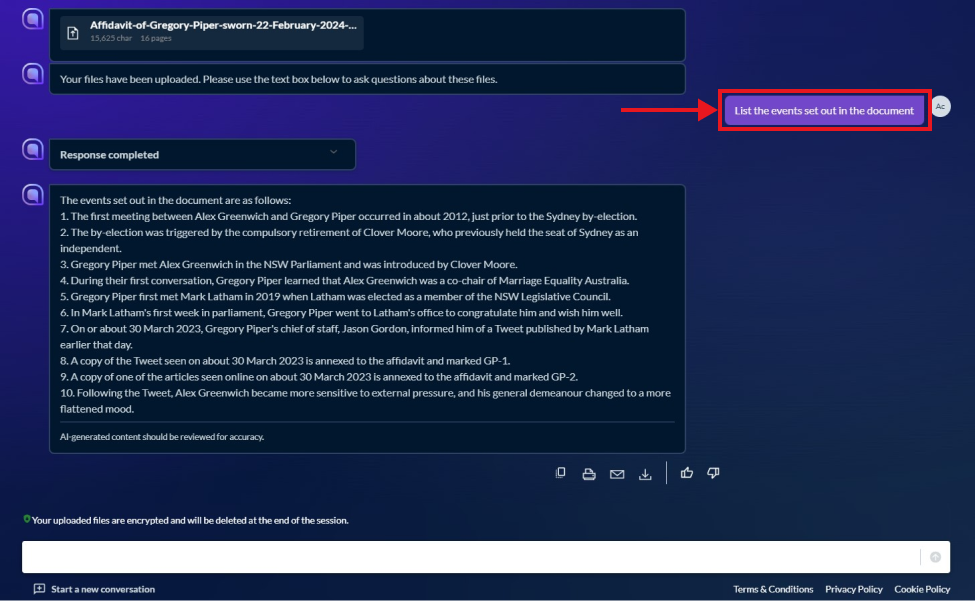
1. Capturing Value in the AI Era:
We explored how firms can redefine value for clients as AI takes over repetitive tasks. With billable hours less aligned with the value provided, there’s a growing need to rethink pricing models to better reflect strategic insights and expertise.
2. Professional Responsibility and AI:
The ethical implications of AI were a major focus, including the need for transparency and oversight. Key questions arose about supervising AI-generated work and disclosing AI involvement to clients and insurers.
3. Training the Next Generation:
We discussed how junior lawyers can enhance their skills as AI streamlines routine tasks. The future may favour those who master skills like prompt engineering to effectively collaborate with AI.


- Legislation Compare: Legislation Compare is an easy way to compare two versions of the same legislation and reduce the time taken to review how the law has evolved over time.
- Leading Cases: Lexis+ surfaces the cross-references to important cases for a legislative provision reducing search time and supporting legal research to drive better and more precise outcomes.
- Practical Guidance: Fully integrated practical guidance experience including practice notes, precedents, checklists, drafting tools and industry insights from leading practitioners now easily accessible from the home page and within legal research results.
- Lexis Answers®: Responds to natural language search queries with the best, most relevant answers from Caselaw taking users to its location within the document.
- Enhanced AI-Powered Search Capabilities that give lawyers more control over their research experience, including:
- Search Tree: Graphically depicts Boolean searches and highlights the impact of each keyword on search results, enabling users to refine and feel confident for the best results.
- Search Term Maps: Visually depicts clusters of terms within search results and documents across major content types for fast, easy navigation, trend identification and direct access to the most relevant information.

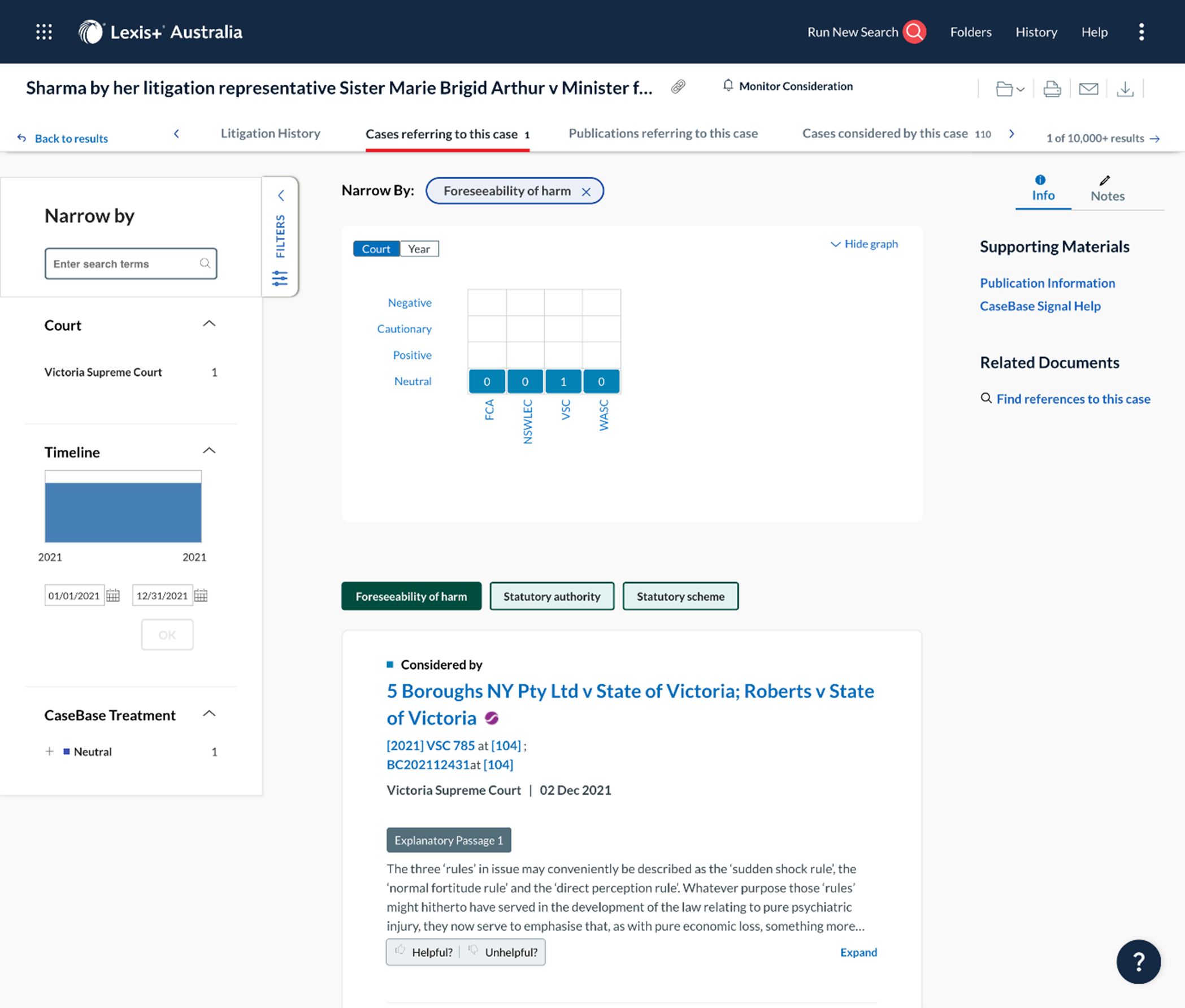
- Target Your Research: Quickly identify cases that focus on the legal issue you're researching, especially when faced with a long list of cases.
- Save Time and Effort: Decide at a glance whether a case is relevant, thanks to the extracted explanatory passages, before committing to reading the full judgment
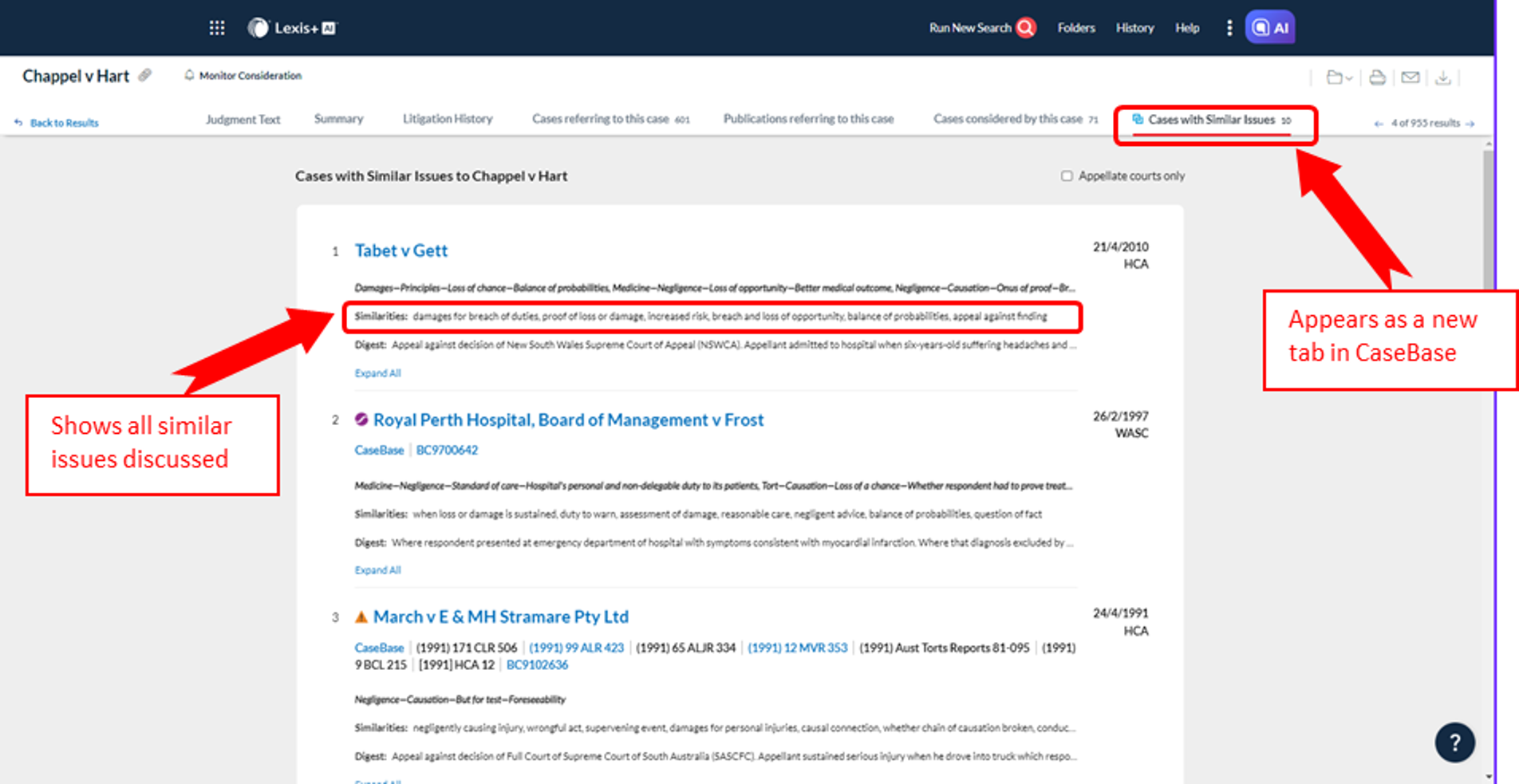
- Broaden Your Research: Access a wider spectrum of relevant precedents and insights.
- Enrich Your Analysis: Gain various interpretations, arguments, and outcomes, helping you build a more well-rounded perspective.
- Increase Confidence: Make decisions backed by a comprehensive view of the legal landscape.
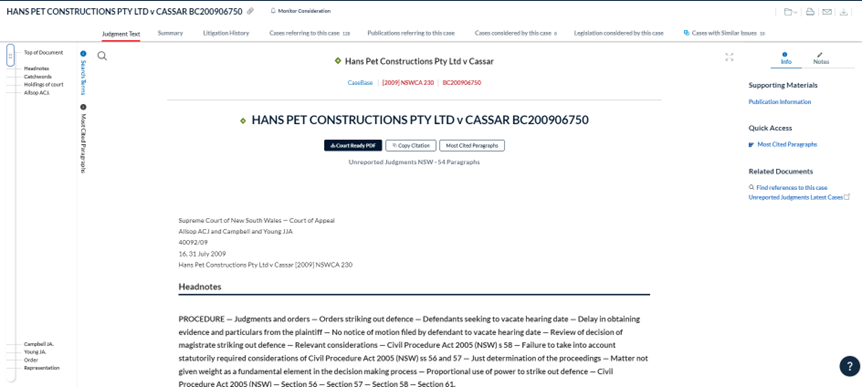
- All in One Place: Access all information related to your main case within a single, unified interface.
- Stay Focused: Reduce cognitive load and distractions, allowing you to concentrate on your research objectives.
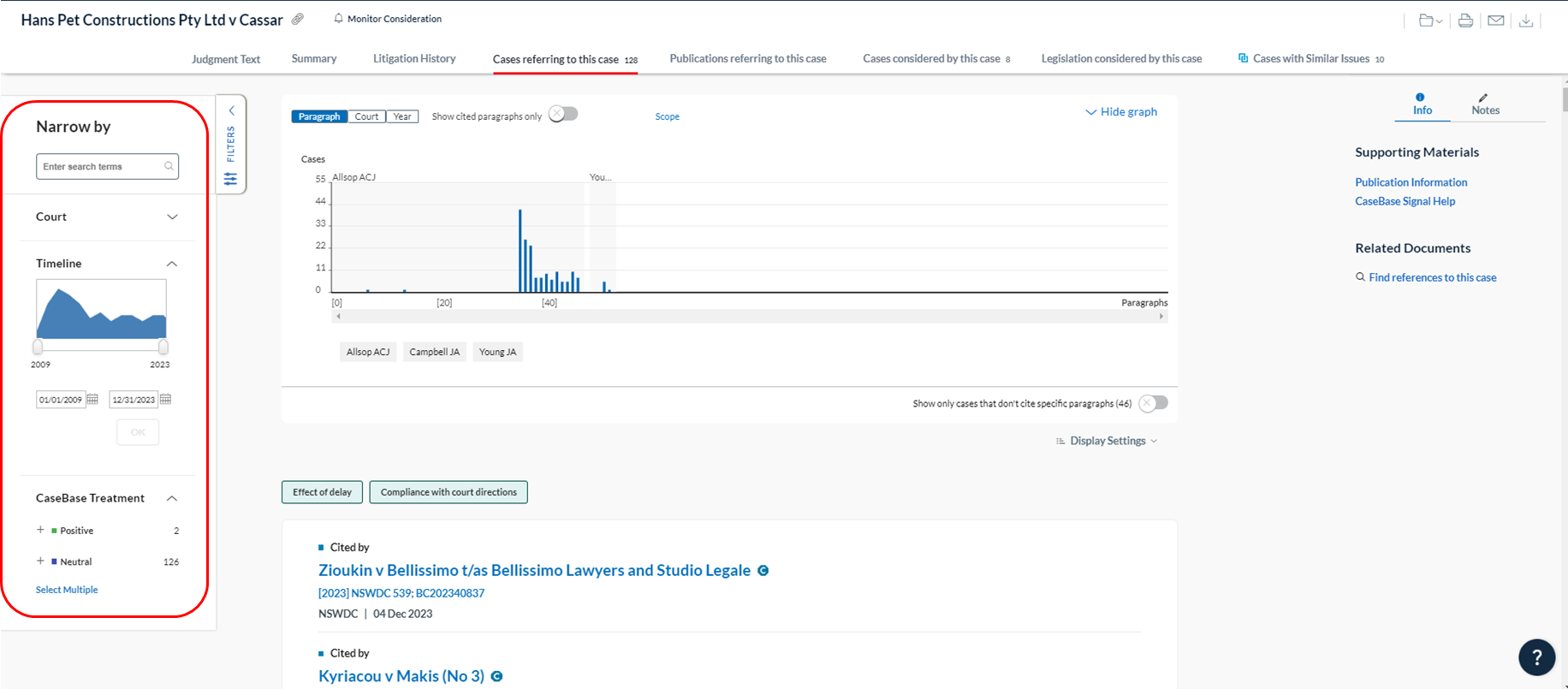
- Court Filter: Select cases based on the specific court that issued the decision, with full court names for clarity.
- Timeline Filter: Focus on cases decided within a specific period by defining a single date or a range of dates down to the exact day.
- Case Treatment Filter: Narrow down the list based on how later cases have treated the main case, such as overruled, applied, or distinguished.
- Precision Search: Apply filters that align with your specific research needs, reducing time spent sifting through irrelevant cases.
- Insightful Research: The Case Treatment Filter, in particular, provides valuable insights into the current legal landscape, allowing you to prioritize cases that have a significant impact on your research.
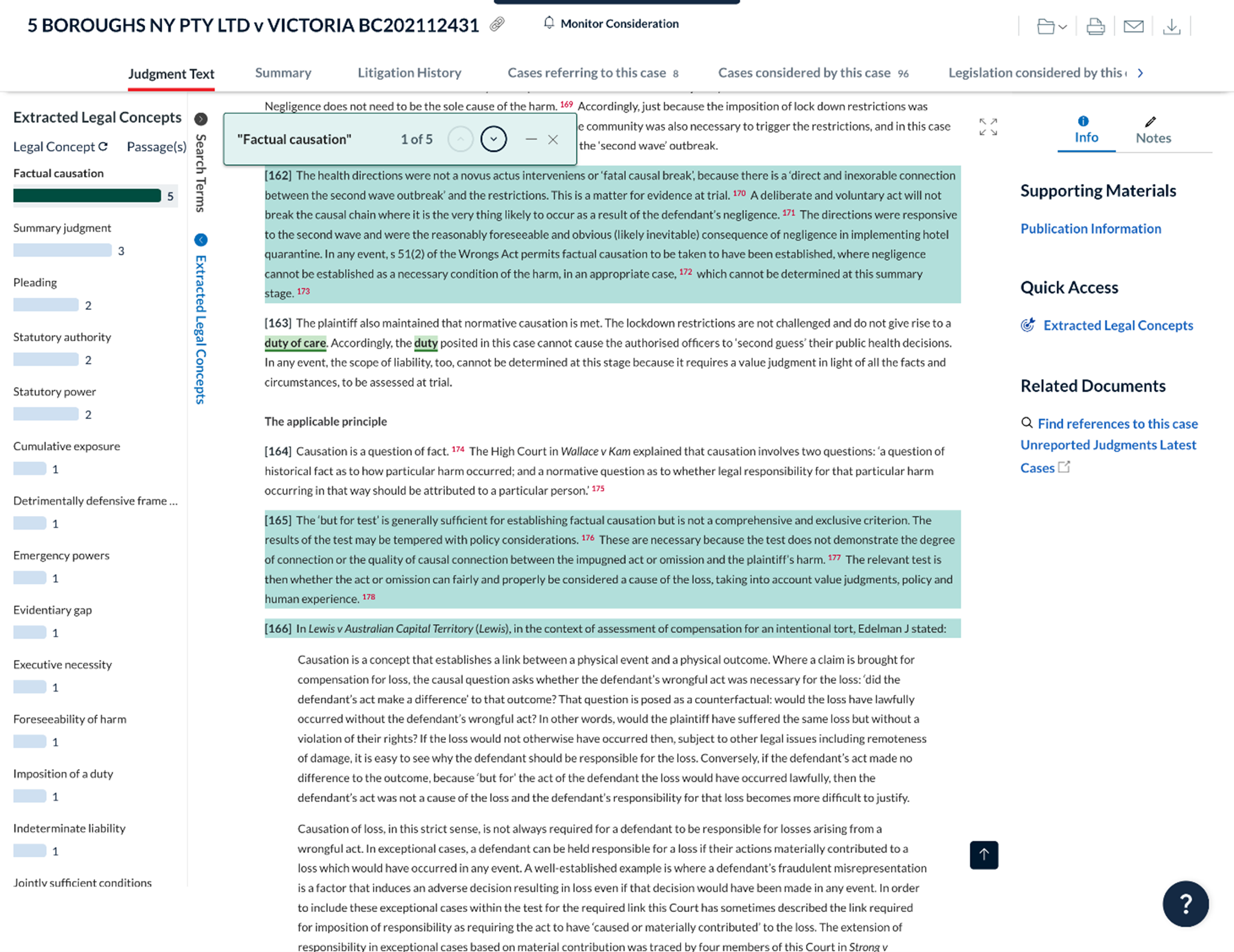
- Focused Analysis: Quickly zero in on the most relevant parts of the judgment by identifying and highlighting passages related to specific legal issues, allowing you to determine at a glance whether the case is applicable to your matter.
- Comprehensive Overview: Gain a clear understanding of what issues are discussed in the case and exactly where these issues are addressed within the judgment text.
- Enhanced Research: Easily find cases that have cited the main case in relation to the legal issue you're exploring, offering deeper insights into how the issue has been interpreted across different contexts.
- Streamlined Workflow: Save time by having both the legal issues and relevant passages at your fingertips, enabling a more efficient and targeted research process.
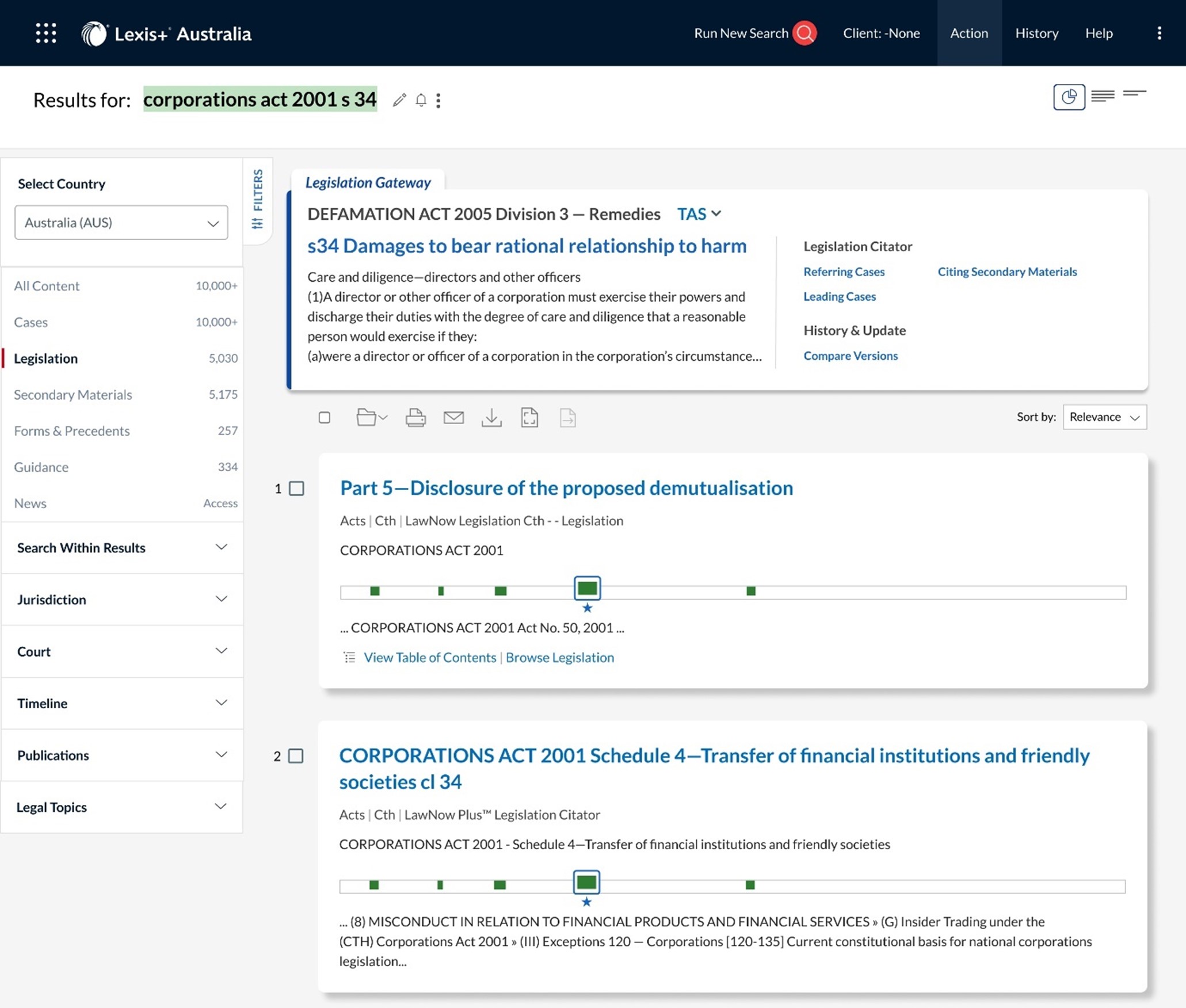
- Effortless Access: Instantly find all relevant information linked to a legislative section in one place, saving you time and effort.
- Streamlined Workflow: With everything you need just a click away, you can quickly navigate through related documents, enhancing your research efficiency and depth.
- Quick Relevance Check: Instantly determine if the provision aligns with your research needs before exploring further resources.
- Convenient Reference: Keep the legislation text within easy reach, allowing you to refer back to it without leaving the citator.
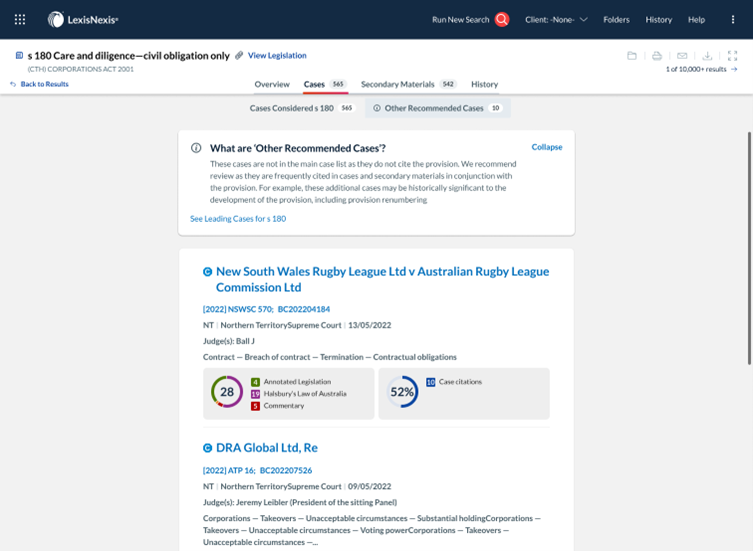
- Broaden Your Research: Expand your research scope by discovering cases that might otherwise be overlooked, offering a more comprehensive understanding of the provision.
- Avoid Missing Critical Cases: Ensure that you don’t miss out on significant cases that could influence your interpretation or application of the provision, even if they aren't in the main citator case list.

- Freedom of Information and Privacy in Australia 3rd edition, available now
- Australian Personal Property Securities Law, 4th edition, available September 2024
- Constitutional Law in Australia 5th edition, available now
- LNAA Annotated Conveyancing & Real Property Legislation New South Wales 2024-2025, available now
- Machines in Our Image: The Need for Human Rights in the Age of AI, available September 2024
- Horsley’s and Lang’s Meetings: Procedure, law and Practice 8th edition. Available November 2024
- Control of Government Action: Text Cases and Commentary 7th edition, available November 2024
- Legal Professional Privilege in Australia 4th edition, available October 2024

- House of Representatives Daily Program and Senate Order of Business
- The legislation lists from Caucus and Joint Party
- Bills Monitor
- The House of Representatives, votes and proceedings and the Senate journals
- Federal Daily Newsletter
- Open Capital Monitor
- Click ? (located bottom right of screen)
- Click Staying ahead of the game – Parliamentary Updates
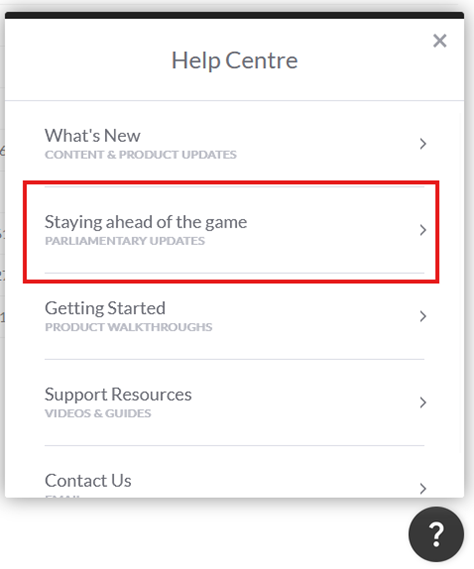

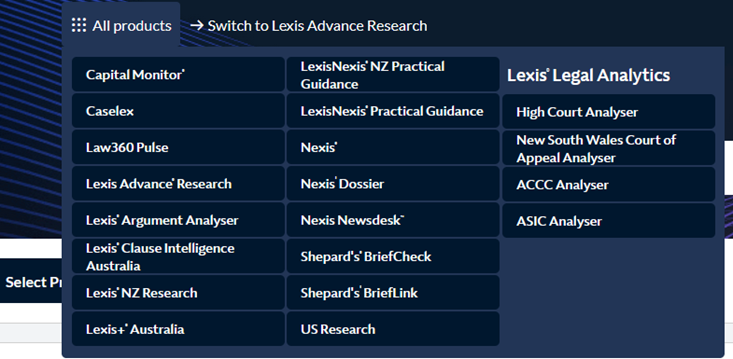
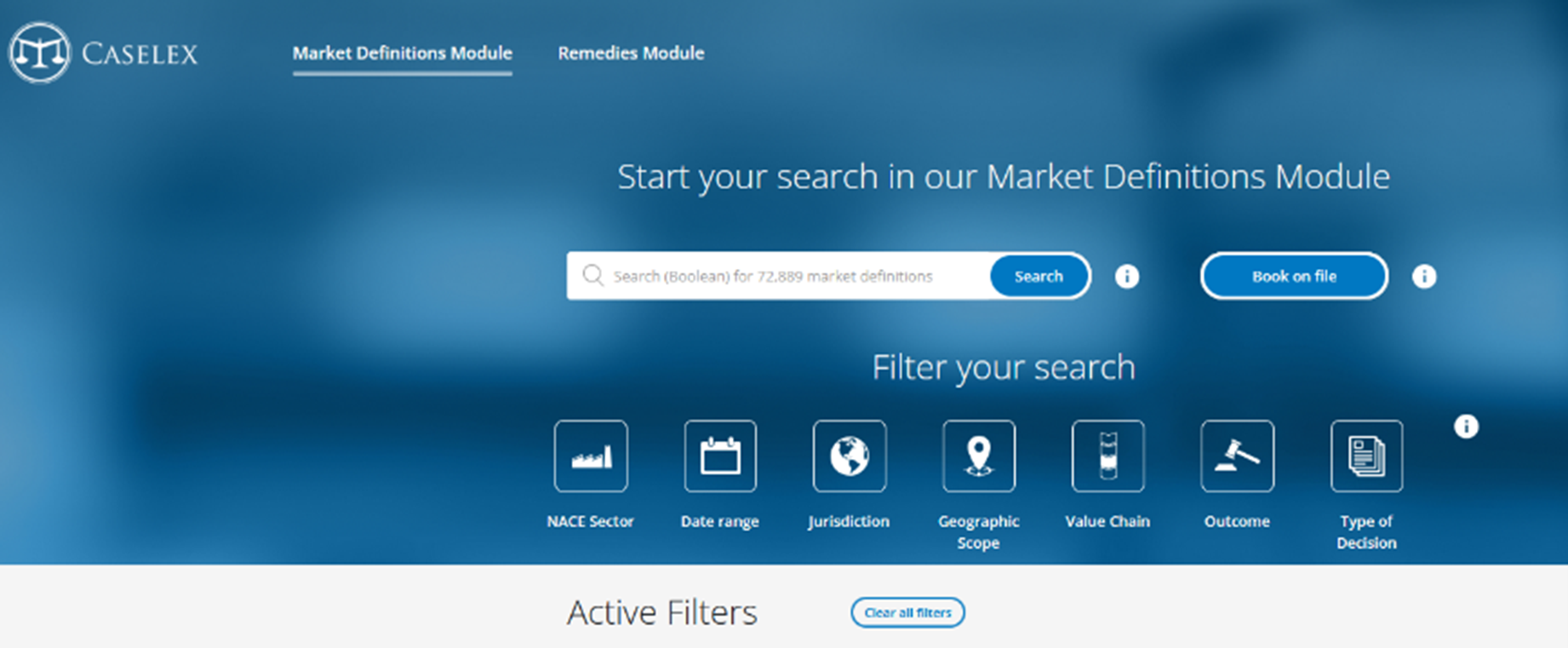

- Drive efficiencies in their workflows, by saving research time
- Enjoy access to comprehensive international coverage, with concise summaries of market definitions and remedies which have been translated into English
- Advise with confidence that you have access to the competition law regulators’ market definition and merger remedies decisions, enabling compelling and timely submissions
- Improve outcomes while managing risks, with access to routinely updated decisions – helping you safeguard the reputation of your firm



- From the Lexis+ [or Lexis Advance] home screen, enter key term(s) in the search field, select AU News from content drop down, and click Search

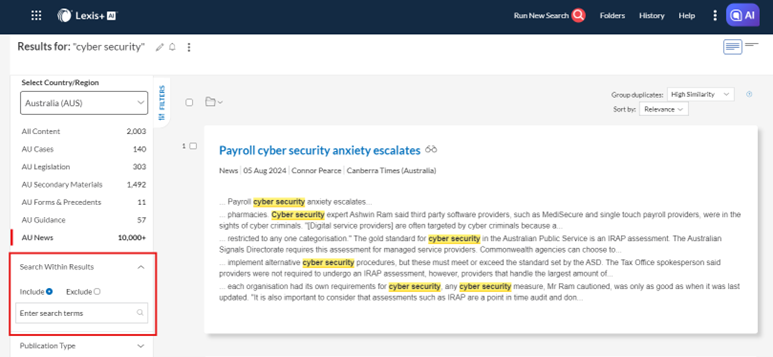
- Enter headline (“cyber security” or cybersecurity and breach) to display articles where these key terms appear in the headline of the article.
- Enter byline (“David Swan”) to display articles that have been written by a journalist or author.
- Enter allcaps (ESG) to display articles where all of the key terms entered appear in upper case.
- Enter caps (Check Point) to display articles where the first letter of each word is capitalised.
- Enter nocaps (“cloud service”) to display articles where all of the key terms entered appear in lower case.

- Click Search
- Click Mange Sources
- Click RSS
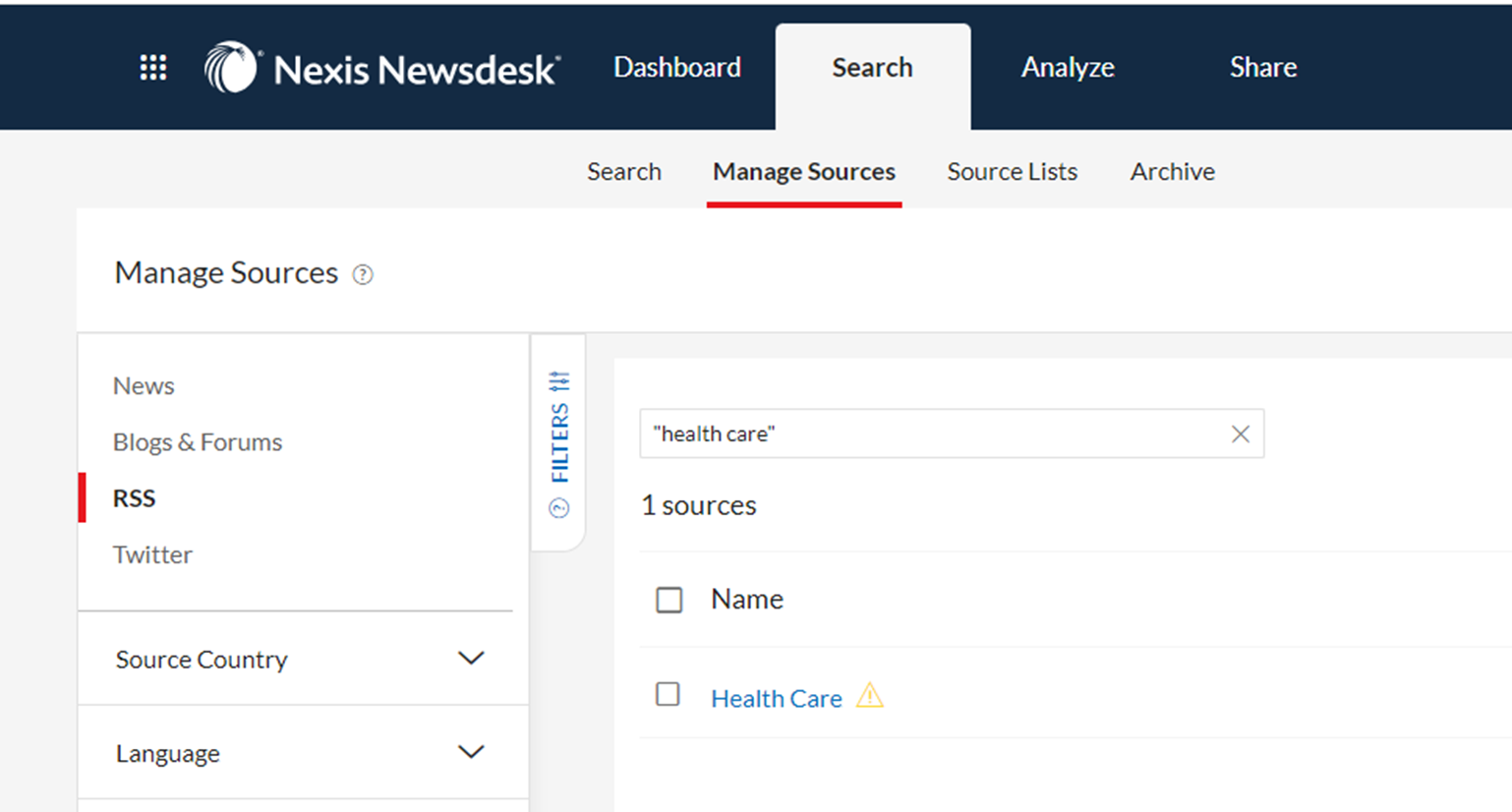
- Click Share
- Click Newsletters
- Click Export Data

- Click Share
- Click Newsletters
- Click Recipients

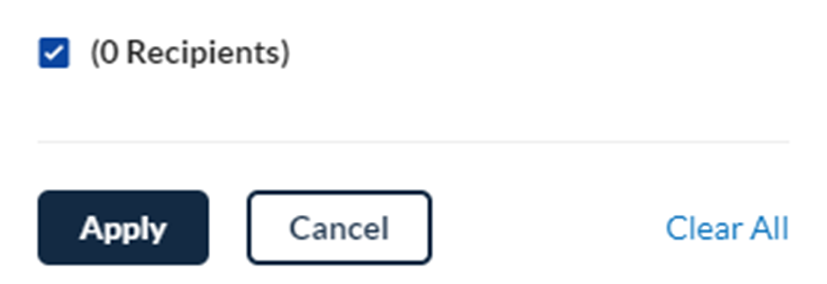

New | Financial Accountability Regime – consequences of non-compliance
To supplement our existing guidance on the Financial Accountability Regime (FAR), new guidance outlining the powers of the regulator and the consequences for accountable entities or accountable persons who fail to comply with their obligations under the regime. The FAR commenced on 15 March 2024 for authorised deposit-taking institutions and will commence on 15 March 2025 for insurers and superannuation trustees.
New | Commercial contracts — remedies
New restructured commercial contracts guidance about general law remedies in commercial contracts disputes, including extensive guidance on damages for breach of contract and key equitable remedies such as injunctions, specific performance, declarations, and account of profits.
New | Commercial disputes — essentials
New focussed commercial disputes guidance to replace the former “Business disputes” topic. This “essentials” topic includes new guidance notes in relation to litigation and alternative dispute resolution methods to resolve commercial disputes.
Coming soon | Distribution and logistics
New topic providing guidance on key distribution and logistics issues to consider when supplying goods, including manufacturing agreements, distribution and reseller agreements, consignment arrangements, carriage of goods, freight forwarding, drop shipping, warehousing and storage.
Coming soon | Outsourcing
New topic providing guidance on outsourcing business functions, including due diligence on outsourcing suppliers, regulatory frameworks relevant to outsourcing, the outsourcing process, and drafting and reviewing outsourcing agreements.
Coming soon | Commercial property — essentials
New focussed commercial property guidance to replace the former “Commercial property law” topic. This “essentials” topic will include consolidated guidance on key areas for commercial property transactions, including sales, leases, remedies, disputes, environmental and tax matters.
New | Guidance on competition law issues with AI
This new guidance provides practitioners with easy-to-digest, practical information on the interaction between AI and competition law, including the key competition law issues associated with AI. The guidance also sets out relevant international actions taken towards addressing competition risks that exist in the space and the Australian regulatory approach.
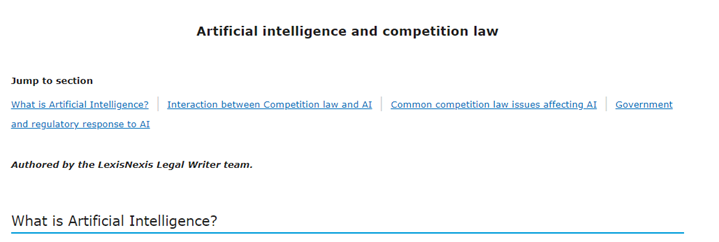
Coming soon | Enhanced guidance and checklist on undertakings under s 87 of the Competition and Consumer Act (CCA)
New guidance on the increased use of behavioural undertakings in merger applications will provide practitioners with practical, relevant information on the Australian Competition and Consumer Commission’s (ACCC) approach to these types of undertakings. The guidance will include recent examples of behavioural undertakings provided by businesses to the ACCC including from Qantas, Brookfield and Telstra. The guidance will be accompanied by a new checklist with a step-by-step list of factors to consider when providing an undertaking to the ACCC.
Coming soon | New sub-topic ‘Sector specific access regimes’
This new sub-topic will cover the telecommunications access regime under the CCA, providing practitioners with the objectives of the regime, relevant undertakings and codes, registered contracts and access disputes and ACCC guidance, compliance and enforcement priorities and case examples. The sub-topic will also cover significant access regimes not already covered in PG Competition such as rail, energy, water and ports. A new checklist accompanying the guidance will help practitioners navigate the relevant issues.
New | Unfair contract terms case compendium and tracker
This new tool compiles relevant links to guidance on unfair contract terms, timeline of reforms, and captures and categorises all terms assessed by the courts or regulators as being unfair for the purposes of the ACL. Use this compendium as a guide when drafting or reviewing clauses that might be considered unfair. The downloadable excel format contains additional sortable filters, including court name, judge presiding and the year of the decision.
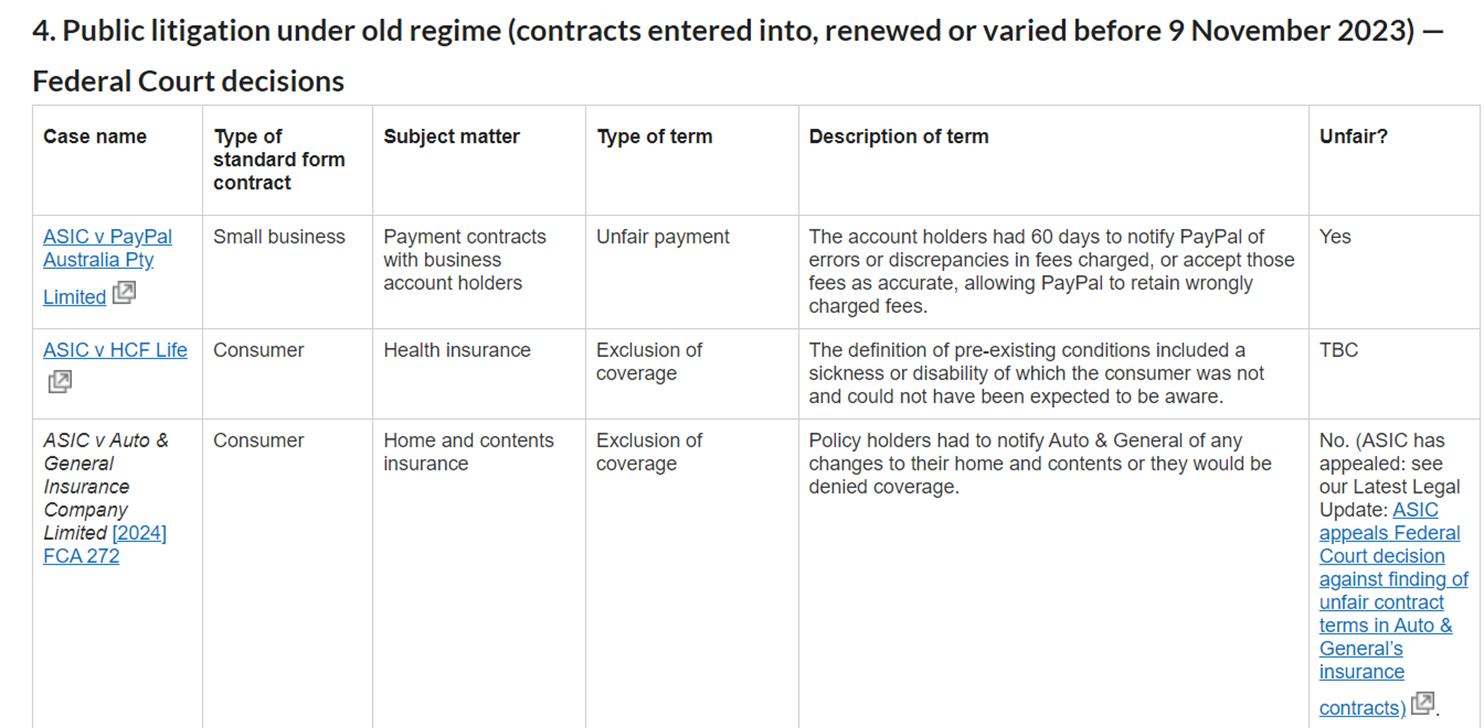
New | Sponsorship agreement precedent
This precedent can be used when drafting an agreement where a business hosts a program or event in relation to which it wishes to make available certain sponsorship, advertising and/or promotional rights to a third-party organisation. The terms in this precedent favour the business, as this is the party that will usually issue the first draft of the agreement to the sponsor.
New | Checklist for making a consumer claim through NCAT
This checklist assists practitioners making a consumer claim in NCAT to file a claim, prepare for a hearing, attend a hearing, and handle the outcome of the hearing.
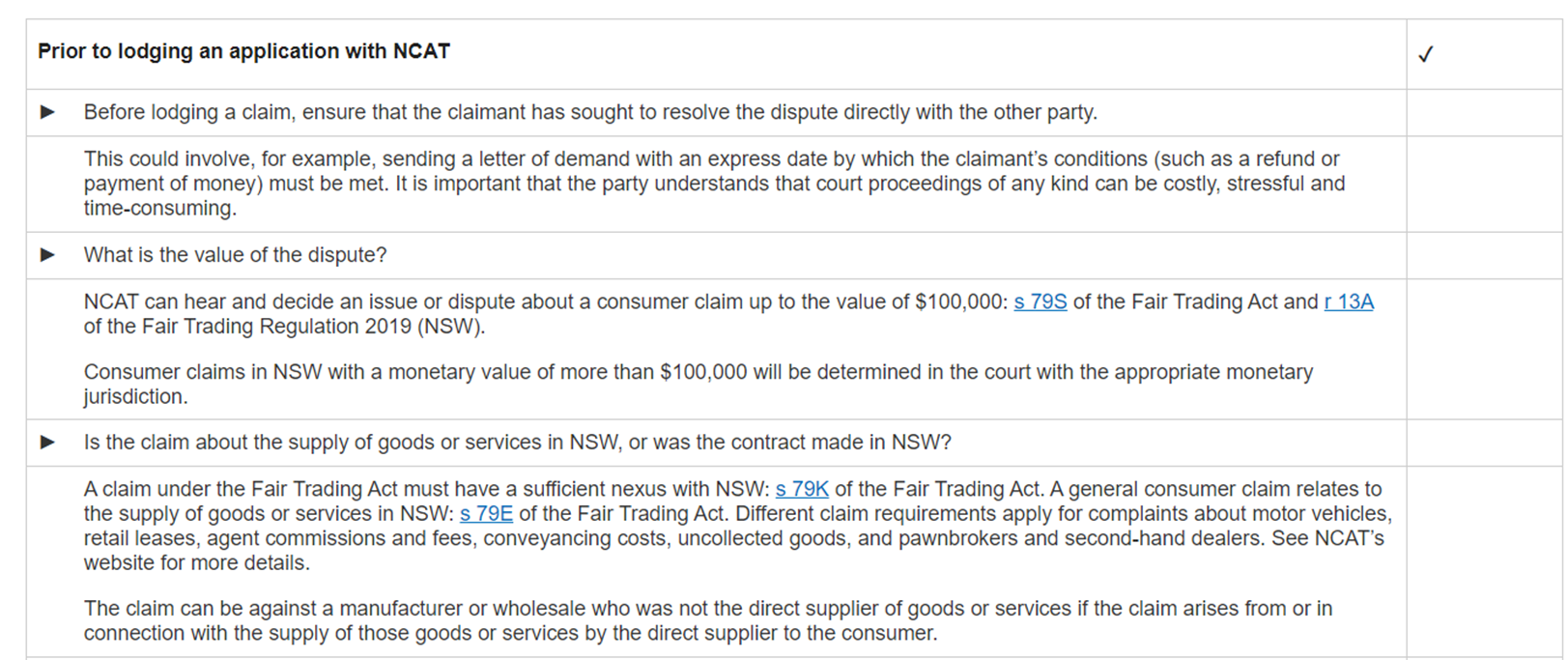
Practice area highlight | Consumer law compliance
The Consumer law compliance topic sets out the policy and processes every business must follow to ensure it stays on top of relevant consumer and competition laws. The topic includes a template compliance statement (which the ACCC recommends that every business should have) and a checklist for reviewing existing compliance statements. This topic also collates several highly useful white label training materials on issues such as unfair contract terms, misleading or deceptive conduct and advertising and marketing law.
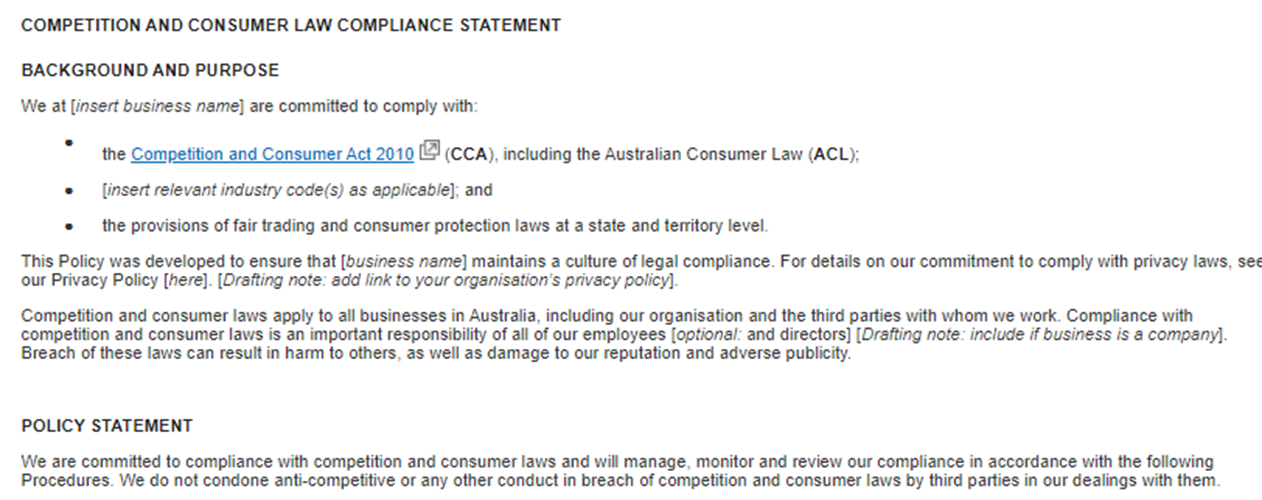
Coming soon | Precedents – resolutions
New precedents for sole member’s written resolution, directors’ circulating resolution and members’ circulating resolution. Other meeting precedents (such as AGM minutes) are currently in development.
Coming soon | Revamped practice area topic layout
New topic structure for the practice area home page to enable customers to browse more intuitively to the content they need.
Coming soon | Current Issues topic
New “Current Issues” topic that will include new content relating to several evolving areas of corporations law including Directors’ Duties, Corporate Governance, ESG issues, Cryptocurrency and Greenwashing.
Updated | A quick guide to general directors’ duties under the Corporations Act
Updated guidance for directors’ duties regarding the expansion of the directors’ duties matrix to include nature & biodiversity risk, AI and cyber risk.
Coming soon | Guidance Note – evolution of the directors’ duties matrix
New guidance note outlining the evolution of the directors’ duties matrix in respect of several emerging issues including nature & biodiversity risk, AI and management of cyber risk.
New | Internet-based offences
New introductory internet-based offences guidance for NSW, Victoria and Queensland that includes Commonwealth and State offences.
Coming soon | Western Australian internet-based offences
An introductory guide to internet-based offences that includes Commonwealth and Western Australian State offences.
New | Topic: Artificial Intelligence
New topic dedicated to one of the fastest-growing and most important technology sectors, Artificial Intelligence (AI). Covering concepts for legal professionals, AI regulation, AI in the Australian market and other evolving concepts, this topic provides a foundational basis to understand the application of AI.
New | Toolkit: Preparations for Privacy Act reforms
The review of the Privacy Act 1988 (Cth) with increased regulatory exposure for organisations is imminent. The new toolkit sets out the steps that organisations should be considering now, so they are prepared for these upcoming reforms.
Toolkit and Flowchart: Determining the application of the Security of Critical Infrastructure Act 2018 (Cth)
The Security of Critical Infrastructure Act 2018 (Cth) is the principal legislation regulating critical infrastructure in Australia. This toolkit aims to provide initial guidance for organisations to quickly determine at a high level whether or not they may be subject to this legislation and, if they may be, the likely extent to which they may be subject to it (ie, which of their assets will likely be ‘critical infrastructure assets’).
Coming soon | New topic: Supply Chains
With increasing oversight by government regulators of cybersecurity, privacy and data protection practices and procedures put in place by organisations, it has become increasingly important for these organisations to understand the protections they can implement in their supply chains to prevent cyber attacks, data breaches, as well as resulting penalties and reputational damages.
Coming soon | New Guidance: Data Protection in overseas jurisdictions – India
Australian organisations are increasingly operating in overseas jurisdictions, which requires an understanding of the privacy and data protection frameworks of those jurisdictions. This new guidance covers developments in the Indian data protection framework and outlines the implications for Australian organisations.
Coming soon | Supreme Court of Western Australia – Appeals
This forthcoming subtopic will provide guidance notes and precedents designed to assist practitioners in navigating the procedural requirements for commencing, responding to and conducting appeals in the Court of Appeal of the Supreme Court of Western Australia.
Coming soon | Digital evidence and AI in civil litigation
This forthcoming topic will provide practitioners with a practical overview of how to manage and deal with digital records, digital evidence and the use of generative AI in civil proceedings. The topic will cover issues such as businesses’ obligations to retain digital records, obtaining digital evidence through preliminary discovery and subpoenas, tech-assisted discovery and document review, the use of digital evidence at trial, and disputes concerning social media and telecommunications service providers.
New | Unfair contract terms
New guidance on the ability of independent contractors to challenge unfair contract terms through the Fair Work Commission, in advance of this new jurisdiction commencing on 26 August 2024. Relevant to any business who engages independent contractors.
Coming soon | New employment agreements
New employment agreements drafted by external expert, Kristin Ramsay of HR Law. These new precedents offering an increased range of optional clauses and allowing employers to select from comprehensive long form employment agreements, or a concise short-form employment agreements, tailored to full-time, part-time and casual employees.
Coming soon | Updates to casual conversion precedents and checklists
Updates to our existing suite of precedent letters and checklists to assist employers and employees in navigating the new ‘employee choice pathway’ for changing from casual employment to full or part time employment.
Updated | The privacy regime in Australia and Australian Privacy Principles
Updated guidance under the topic “Introduction to data privacy laws” including contemplated changes to privacy legislation and practical tips for preparing for those changes.
Updated | Checklist of core financial reporting requirements
Updated checklist with detail on new requirements for consolidated entity reporting and declarations.
Updated | Checklist for establishing a corporate governance framework
Update to checklist to include a list of documents and policies that form the basis of a corporate governance framework.
Coming soon | Operational management topic
New guidance notes to assist in-house counsel to manage legal operations, the legal team and to measure and analyse legal team productivity.
New | Powers and duties of administrators
Newly streamlined guidance providing a concise summary of an administrator’s powers and duties. Enables someone new to the issue to get up to speed quickly.
Updated | Bankruptcy topic
Updated for recent changes to bankruptcy laws. This is a practitioner’s essential “how to” guide for personal bankruptcy, from bankruptcy notices to creditors’ petitions and trustee actions.
Updated | Disclaimer of onerous property
Updated and expanded guidance on making an application for leave to disclaim contracts including new content on what to include in an affidavit of a liquidator in support of an application.
Coming soon | Using the safe harbour to avoid insolvent trading
Overhauled and updated guidance, including to reflect experience and insights from industry participants in the Review of the insolvent trading safe harbour report tabled to Parliament on 24 March 2022.
Coming soon | Checklist - Using the safe harbour to avoid insolvent trading
New checklist to accompany the expanded and updated guidance providing an easy way to check a client is undertaking a safe harbour process correctly.
Coming soon | Unfair preferences
A new precedent affidavit in support of an unfair preference application suitable for use in all State Supreme Courts and the Federal Court.
Updated | Artificial intelligence and IP
As we know, IP is often used to generate new material. With developments in AI technology continuously evolving, it is important to know what the impact and effect of IP law in Australia is on AI; what is less certain; and what key issues may arise. You can do this by looking at our subtopic Artificial Intelligence and IP. Added to the module in 2024 and already recently updated, the essential guide discusses how IP laws interact with AI technology, Copyright infringement and AI, the uncertainties arising in IP law and International developments.
Updated | Foreign investment topic and materials
Updates to the topic “Related legal considerations — Foreign Investment Review Board” and supporting checklists and precedents to reflect “strengthening and streamlining” changes to Australia’s foreign investment framework, which were announced in May 2024.
Coming Soon | Skeleton target statement for off-market cash-only takeover bid
Significant new precedent, providing skeleton drafting and best practice guidance to support public M&A practitioners acting on takeover bids. Intended to be used and read alongside matching bidder’s statement precedent. Authored in collaboration with external expert Belle Jing of Marque Lawyers.
Coming Soon | Updates on proposed merger law reforms
Updates to the sub-topic “Competition and Consumer Act 2010 (Cth) and Australia’s merger control regime” to reflect new details on proposed merger reforms, as these continue to evolve in conjunction with the government’s consultation process.
New | Commercial leasing precedents
Building upon our existing commercial leasing precedents, we have published the following new precedents: Deed of assignment and consent to assignment of lease or sublease; Deed of consent to change of control; Landlord’s notice of consent to change in control of tenant; Commercial sublease (NSW); Retail sublease (NSW); Requests for information – commercial property; Lease review / due diligence form (short form); Lease review / due diligence form (long form).
New | Foreign investment in acquisition and leasing transactions
New guidance on when approval is required for a foreign person to acquire or to lease or licence land in Australia. This new guidance is accompanied by a workflow checklist to identify whether the Foreign Investment Review Board (FIRB) framework applies to the acquisition of interest in Australian land. A new precedent special condition for a lease or licence which makes the grant of the lease or the licence subject to the tenant or licensee procuring a FIRB approval. These documents will help practitioners shortcut assessing when the FIRB framework needs to be considered when acting in the sale, acquisition, lease or licence of land or property in Australia.
Coming soon | Elder Law topic
New topic of Elder Law that will cover acting for elders; capacity including the legal test, practical guidelines, sample doctor letters and checklists; vulnerability and abuse of elders including discrimination and case studies; alternative decision makers including powers of attorney, guardianship appointments and roles of tribunals; elder law planning including accommodation and financial considerations re transition to retirement, occupation rights, granny flats, retirement villages, settled land act; and end of life decision making including end of life law, advance care directives, voluntary assisted dying, palliative care guidelines and multijurisdictional legislation.



